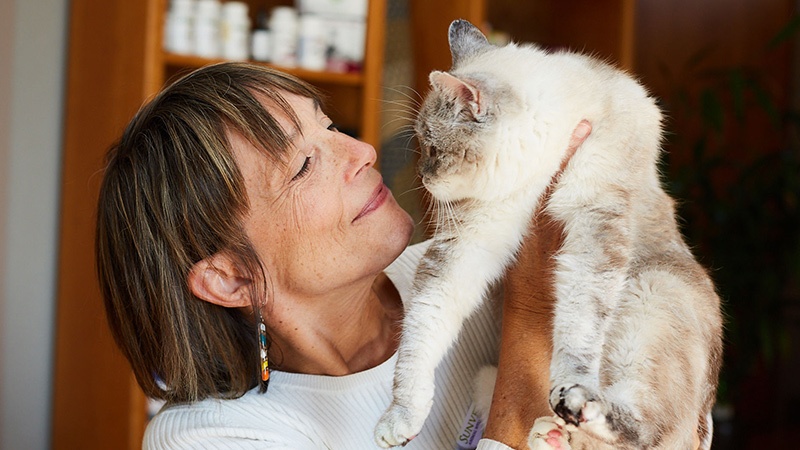
There goes Bee, my thirteen-year-old siamese-like kitty, dashing out the door and down the hill to munch on the brand spankin’ new, soft, chartreuse spikes of grass coming in next to the creek. Pretty much every cat that has lived with me has been a grass-grazer. I have also known felines that couldn’t give a rat’s a– about anything green!
If you haven’t already, open yourself up to the wonderful world of feline grasses, greens, and veggies, especially, if you have a strictly indoor kitty companion!
While cats are obligate carnivores, there are several theories as to why they chow down on grass. Perhaps they eat grass because it provides an enzyme that allows them to digest other vegetables in the guts of their ‘kills,’ or to make themselves throw up, eliminating unwanted contents in their stomach such as hair. Perhaps it’s because grass contains nutrients such as folic acid or it could help remedy and prevent constipation. One final hypothesis is that greens for cats can help to rid them of intestinal parasites by physically scrubbing the walls of the gut. So, while they may not NEED it, grass is a great source of fiber and can help improve digestion, while removing any indigestible materials they may have taken in.
Do I, Asheville’s natural veterinarian, think it’s a good idea to give your purr-bucket something green to munch on, especially if they live inside? Heck yeah!
Even if your feline is an indoor/outdoor cat, offering her bits of kitty salad is lovely and will be much appreciated.
Wheatgrass is the most common type of grass sold as ‘Cat Grass.’ This variety is a wonderful source of vitamins E and B-6, riboflavin, niacin, manganese, zinc, and pantothenic acid. A combination of Wheat/Oat grass is also a commonplace mixture. Some folks claim their cat prefers lemongrass to any other plant! You can grow your mini-lawn yourself, or, if you lack a green thumb, there are ‘cat grass’ kits available at your local pet food store. If you choose to set up and cultivate your kitty’s grass plot, light and warmth will help them grow bigger and healthier. If you happen to have too little natural light, the situation can be remedied with grow lights. These grasses must be kept short by either the kitty “mowers” or you and your hand clippers.
Sunvet Animal Wellness Clinic clients that don’t grow grass for their purr-buddies will often pick up our Barley Cat. This gently dehydrated barley grass powder is loaded with active enzymes that are often missing in processed cat foods. Sprinkling Barley Cat on your cat’s food will not only enhance the taste but may also enhance nutrient absorption. I always suggest starting your feline on ¼ the suggested dose, so she can become familiar with the new taste.
Cats and Houseplants
I have found, the cats that adore grass will pretty much also eat any other plant or veggie in sight. Because I receive many questions about houseplants and safety issues, I thought I would include a small section on kitty-safe houseplants!
Ferns such as the Boston fern and maidenhair fern are safe, as are most palms. Blooming plants such as the African violet, African daisy, and orchids won’t harm your cat if she takes a bite. Safe green plants include coleus, corn plant, dracaena, and spider plant. If you supply your beautiful panther with edible houseplants, be sure that you’re not using chemicals on the plants or in the soil (some cats love to dig in dirt) that your cat could accidentally ingest. You will find the link to ASPCA’s list of toxic and non-toxic plants for dogs and cats here.
For those of you that like to share your lovely food with your mouser, there are a few ways to approach serving veggies. Superb vegetables to offer your cat are chopped carrots, peas, frozen corn, broccoli florets, green beans, zucchini, lettuce, spinach, winter squash, and pumpkin. This produce should be cooked (steamed is best) since felines, just like us humans, lack a sufficient way to break down plant cell walls. An added bonus to feeding bits of winter squash or pumpkin is that they contain a bacteria that, when eaten in moderation, can actually help normalize your kitty’s bowel environment and relieve constipation or diarrheal issue. Green beans, with their natural fiber, are a perfect snack for your overweight Tom.
Herbs are also the cat’s meow!
Bee balm, catmint, catnip, chamomile, chervil, dill, hyssop, lavender, lemon balm, licorice root, dandelion root, verbena, lovage, peppermint, oregano, parsley, rosemary, sage, and thyme may please your feline’s palate.
Bring the green plant energy inside and into your furry friends, and let us know in the comments how it goes!


